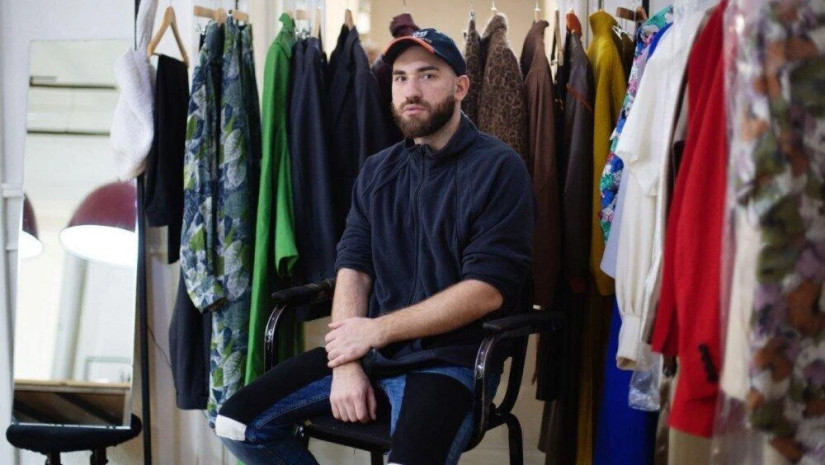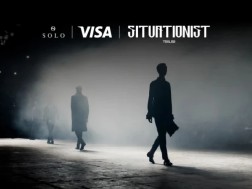As you walk down Aghmashenebeli Avenue in one of Tbilisi’s most vibrant districts home to many historic, cultural and artistic establishments, you inevitably realize why this neighborhood fits Situationist’s workshop best. The young fashion label finds inspiration in Georgia’s rich historic heritage and mixes it with avant-garde style and collaborations with new wave artists. International fashion connoisseurs were able to appreciate the latest Fall/Winter 2021-22 collection released by Situationist on the digital platform of Paris Fashion Week (PFW) on 2 March.
Situationist is a member of the newly established Georgian Fashion and Apparel Association (GAFA) – a business cluster created with support from GIZ’s Clusters4Development project funded by the European Union under its EU4Business Initiative and the German Government. The project has been supporting Situationist’s participation in the official part of PFW since last year contributing to the development of visual materials for digital presentation of the label’s collections.
Clothes made to suit character
Situationist started in 2015 as a collaboration of Irakli Rusadze and Davit Giorgadze. Irakli, a self-taught designer, is now the creative director behind the label, while Davit, an artist and photographer, contributes to the visual aspects. The concept of the brand is based on the notion of creating clothing that fits the character, has universal appeal and could be worn anywhere. For Situationist being trendy is not enough, there should be a meaning to what the brand creates.
One unique characteristic of Situationist’s clothing lies in the production process itself – each garment is cut and sewn by one seamstress. This is Irakli’s way of encouraging the craftsmanship of his team members.
“Only one name cannot define the brand. Our clothes are products of a team work. Designer can do nothing without a skilful team. It is important that each piece of clothing is made by same person. This enables our team members to develop multiple skills and make clothing in its entirety from cutting to sewing.” – he says.
As a wonderful nod to the work of seamstresses their signatures are placed on a special label for each item they produce.
Mercedes-Benz Fashion Week Tbilisi 2016 catapulted Situationist into the international fashion limelight and since then it has been the first Georgian fashion label to show collection at Camera Moda in Milan and in the official part of Paris Fashion Week with its third appearance this year. The brand has been covered in leading international fashion media dubbing it as Georgia’s most cutting-edge young brands. Its collections have been described by international reviewers as minimalist, sophisticated, and edgy.
Working in times of pandemic
As COVID-19 broke out Irakli and his team were worried about the consequences that the company could face. Risks were high, but fortunately, unlike some peer designers, who faced problems, Situationist managed to sustain its workforce of 22 employees and ensure uninterrupted production process. A major challenge came up when a lockdown was established in Georgia last December. This was the time when the company had to deliver orders. Clusters4Development responded to the needs of Situationist and other GAFA member SMEs and provided support to cover transportation costs for staff during two months of lockdown. This support was instrumental for the companies whose resources were limited because of coronavirus crisis.
Situationist’s sales have increased by 34% in 2020, particularly for its Spring/Summer 2021 collection presented at PFW. Connections with three new vendors were established since presentation of the Spring-Summer 2021 collection at PFW last year. Situationist is currently selling via dozen leading international fashion retailers and online stores, with NET-A-PORTER, ISETAN, LLOOMM, CASIMIR making the list, to name just few. More partnerships are expected after this year’s successful presentation at Paris fashion show.
Sustainability at heart of the brand
The brand takes pride in the high-quality natural fabrics it uses and superior craftsmanship. Irakli is personally involved in every part of tailor-making and even folds and packs each ready item. While there are hopes for expansion of production capacities in the future, the brand intends to keep its commitment to excellence and exclusivity.
Most importantly, the company adheres to the principles of sustainable apparel production as it applies waste-free processes. This requires significant effort and time, but the processes are planned in a way that production is carefully measured, and this brings waste in fabrics and materials to almost zero.
Situationist sees an opportunity in GAFA membership for raising awareness and further development of the company. Importantly, GAFA will provide an access to knowledge needed to improve management processes, including via trainings. Clusters4Development plans to identify needs of individual GAFA members and will tailor its support accordingly. GAFA also provides a useful platform for peer-to-peer exchange and collaboration. This is another element that draws Situationist team into the cluster.
“Situationist is a result of a team work, with collaboration, partnership driving the brand. GAFA provides a good format to connect with other industry players for exchange and cooperation.” – says Irakli.
Georgian Apparel and Fashion Association (GAFA) currently unites 24 textile producers, fashion designers, factories and ateliers with over 1,000 employees in total. GAFA positions itself as a cluster supporting and enhancing high-quality, environmentally friendly and sustainable apparel and textiles. Among other areas, Clusters4Development project supports access of GAFA members to international tradeshows, digital showrooms, fashion shows and exhibitions.














